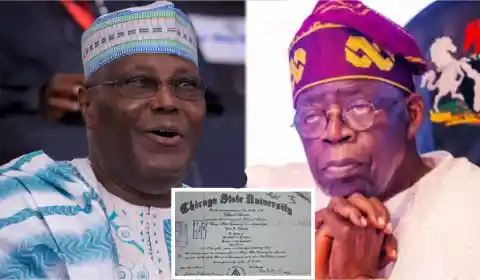U.S. Court Reserves Judgment in Atiku Records Case Amidst Gender Identity Confusion.
The United States District Court for the Northern District of Illinois, presided over by Judge Jeffrey Gilbert, has reserved judgment on the subpoena application for Bola Tinubu’s records, following a surprising revelation about the Nigerian president’s college transcript. The transcript, used by Tinubu to gain admission into Chicago State University (CSU) in 1977, indicates that it belonged to a female.
Read Also Former Governorship Candidate Becomes Special Adviser To Governor Oborevwori Of Delta State
The confusion arose when Christopher Carmichael, the lawyer representing Bola Tinubu, brought up the issue of gender identity to question the seriousness of the case before the court. Carmichael dismissed the case as a frivolous conspiracy theory propagated by Tinubu’s political opponents in Nigeria, comparing it to the unfounded claims made by Donald Trump about Barack Obama’s birthplace.
However, Alexandre de Gramont, the lawyer representing plaintiff Atiku Abubakar, countered Carmichael’s argument. He informed the court that the possibility of Bola Tinubu being a woman was first revealed in records produced by CSU itself. These records were submitted by the school in mid-2022 while complying with a state court subpoena.
Read Also I Don’t Want My Daughter to Live The Life I Lived – Adekunle Gold
The records showed that Bola A. Tinubu was admitted to CSU in 1977 based on a transcript from Southwest College Chicago, which was marked as belonging to a female. The confusion deepened when CSU lawyer Michael Hayes confirmed the submission of these records to Nigerian civil rights lawyer Mike Enahoro-Ebah in 2022. Hayes asserted that Bola Tinubu was indeed the individual who attended and graduated from CSU.
However, Hayes was unable to explain the contradictions, and CSU’s administrators could not provide sworn testimony to confirm the authenticity of the certificate Tinubu had been using.
The judge expressed his confusion and the need for more time to process the matter, especially given the confirmation of the records released by CSU in 2022. Judge Gilbert stated that he would have to take the matter under advisement and might require additional documents or clarifications from the parties involved.
The case revolves around Section 1782, a statute that allows the release of documents and evidence domiciled in the U.S. to be used in foreign proceedings, particularly with countries like Nigeria that have legal reciprocity arrangements. Atiku Abubakar, the plaintiff in this case and a presidential candidate in the February polls, seeks the subpoena to clarify questions regarding Bola Tinubu’s background, including age, gender, and citizenship status. These records are crucial to Abubakar’s case that Tinubu should not be Nigeria’s president because he submitted a forged certificate to the Independent National Electoral Commission (INEC), violating Nigeria’s Constitution.
Section 137 (1)(j) of the Nigerian Constitution (amended in 2010) states that no one can be legitimately elected president if they have presented a forged certificate to INEC. The controversy around Tinubu’s certificate centers on its alleged issuance in 1979, signed by Elnora Daniel. However, Daniel only arrived at CSU in 1998, resigning in 2008 amidst a financial mismanagement scandal.
While the Nigerian Court of Appeal upheld Tinubu’s election in September 2023, Atiku Abubakar plans to appeal the decision to the Supreme Court, arguing that Tinubu has violated the Nigerian Constitution and should not continue in office. De Gramont urged the court to expedite a ruling on the subpoena application, as Abubakar’s window for appealing to the Supreme Court was narrowing.
The PDP presidential candidate now has only six days left of the statutory 14 days to appeal the tribunal decision that affirmed Mr Tinubu’s election victory last Wednesday.









